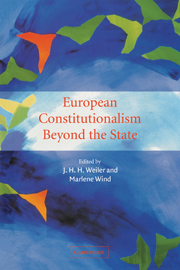Epilogue: europe and the dream of reason
Published online by Cambridge University Press: 26 June 2009
Summary
The sleep of reason produces monsters.
F. Goya, Los Caprichos (1799)Ideal self-constituting
What we need is a metaphysics of Europe's self-constituting. What we do not need is a rationalization of ‘European integration’. Still less should we act as apologists of the current incoherent state of the public realms of Europe, a state of affairs which is an unwilled and irrational outcome of countless coordinated and uncoordinated acts and events – a leviathan of shreds and patches. ‘European Union’ is an Ungeheuer which is an Unganze.
There was Europe – as place, as subjectivity, as potentiality – before there were the social systems (‘states’) which the usual conception of ‘European integration’ presupposes. The true self-constituting of the people and the peoples of Europe requires a new concept (Begriff) of their perennial unity, not merely an explanation of a particular negating of their recent disunity.
Europe – as place, as subjectivity, as potentiality – is not the natural product of organic processes. It is a product of, and in, consciousness. Societies constitute themselves ideally by imagining collectively their identity, their unity and their purpose. The ideal self-constituting of a society is a process of collective thinking, embracing every kind of thinking, theoretical and practical, disinterested and subjective, rational and irrational.
- Type
- Chapter
- Information
- European Constitutionalism beyond the State , pp. 202 - 225Publisher: Cambridge University PressPrint publication year: 2003



